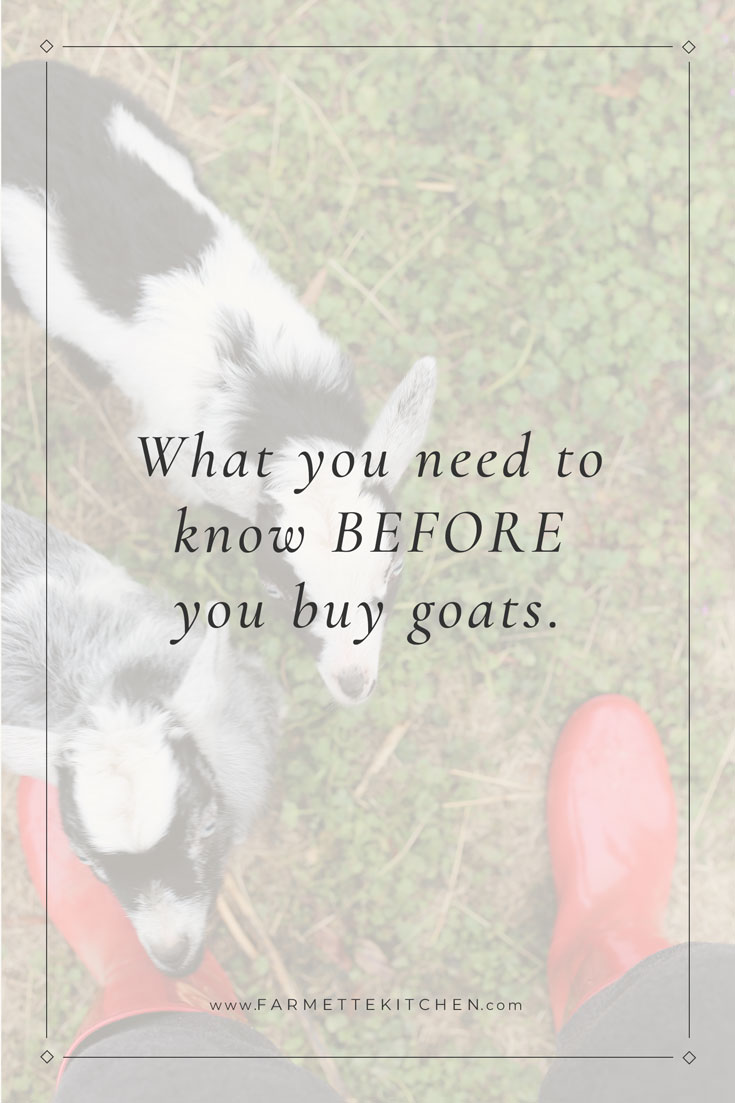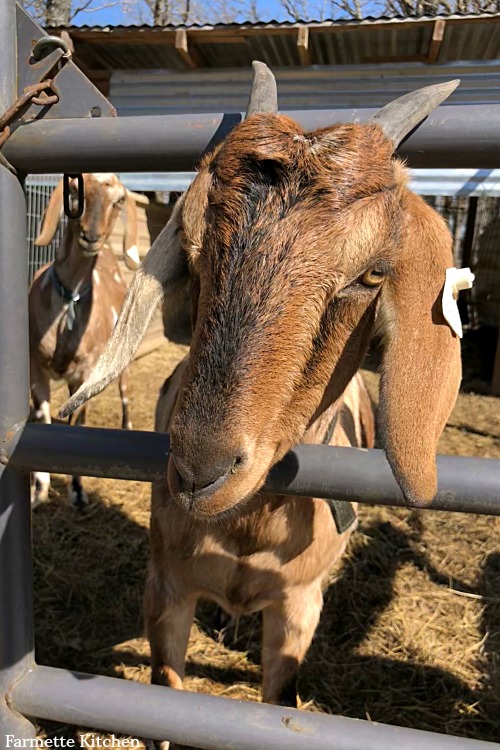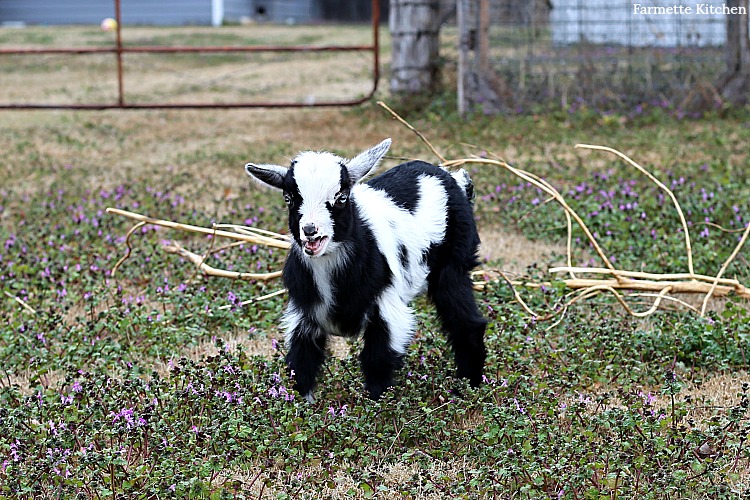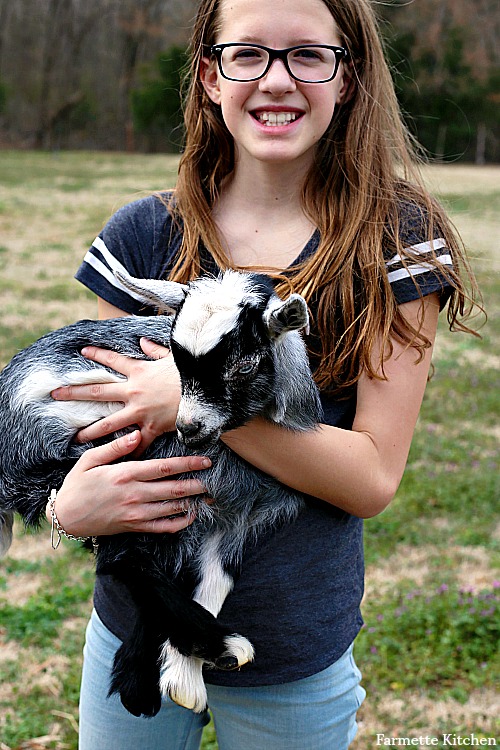When James and I bought Grover and Sonny, we quickly learned there are definitely some things you need to know before you buy goats. We were extremely lucky to buy from a knowledgeable breeder and she shared a wealth of information that helped us tremendously in those first few days.
One of the first things you need to know before you buy goats is that goats are herd animals and need companionship with their own kind. Congratulations... you are no longer buying a goat, you are buying GOATS! Now you need to decide size, breed, and gender. Quickly followed with decisions about horns, vaccines, and fencing.
Maybe the most important question to ask yourself before you buy goats is: why are you buying them? This will help you decide breed (Do you want to milk?), if disbudding is right for you (Do you want to show?), and what gender you want (Do you want to breed?).
Goat Terminology
- Baby goats are called kids.
- Female goats are called does or nannies.
- Uncastrated male goats are called bucks or billies.
- Castrated male goats are called wethers. (Castration= the male-specific term for neutering; i.e. removing the testicles)
Goat Breeds
There are hundreds of different goat breeds and two sizes of goats: miniature and standard-size. Different breeds serve different purposes: such as meat (Boer), milk (Nubian), fiber (Cashmere), or backyard companions (Nigerian Dwarf). Pygmy and Nigerian Dwarf goats are both miniature goat breeds and make great backyard pets. Pygmys are considered a meat breed due to their stocky build, while Nigerian Dwarfs produce quality milk and are considered a dairy breed.
Purebred goats can be registered, like dogs, and shown in 4H competitions and livestock shows. If showing is important to you, remember to take this in consideration when selecting a breed before you buy goats.
Goat Fencing
Proper fencing for goats is paramount. If there is ONE thing you must do before you buy goats it is construct a safe and secure fence. Goats like to rub on fences, try to stick their heads through openings, and are very clever about getting out of their enclosures. Sufficient goat fencing needs to be escape-proof: high and tight. Goats are like cats in the sense that if they can get their head through it, chances are the rest of their body will impossibly fit through as well. If you use wire, make sure it is sturdy enough that a goat can't bend it or push it down to escape.
Goat Structures
Goats need a draft-free shed or barn for cover, sleeping, and protection from predators and extreme temperatures. A three-sided structure is not enough. Goats are foragers so you will need a yard that gives them enough room to roam to find food. You’ll also need somewhere to safely store their food and somewhere to dispose of their soiled bedding. Your structural needs will increase if you plan to breed and/or milk your goats.
If you do plan to breed, you will need a separate setup for the dam (doe that has successfully produced kids) with her kids and another for the buck. Also, keep in mind that goats can start breeding very young (around 6-7 weeks old) so you don't have much time to decide if you want to breed. This is another important consideration to make before you buy goats.
To Disbud or Not
Both male and female goats are born with horns, with very rare exceptions. The decision to remove these horns or leave them be is passionately debated among goat owners. We made the choice not to remove Grover and Sonny's horns.
The process of removing a goat's horns is called disbudding. Disbudding is typically done with a hot iron when the goat is very young (a few days old) in order to remove the "buds" of the horns and prevent the horns from growing. I would recommend that you do your research (success rate, potential problems, etc) and pay to have your goats disbudded by a trusted veterinarian. Again, this is a decision to make prior to purchasing your goats.
Goat Veterinary Care
Just like dogs, cats, and other pets, goats need occasional veterinary care. Vaccinations are another topic of great debate between goat enthusiasts. Our breeder suggests the CDT vaccine- clostridium perfringens types C and D and tetanus. This vaccine prevents tetanus and enterotoxemia (overeating) that's caused by two different bacteria. Goats should also be de-wormed and have their hooves trimmed regularly.
Additionally, if you do not intend to breed your male goat, he will need to be castrated; this will help with temperament and smell. Like disbudding, castration is also best performed by your veterinarian when the kid is very young.
Grover and Sonny
Our goats, Grover and Sonny, are a mix of Pygmy and Nigerian Dwarf. We chose two males, whom we had castrated but not disbudded. We wanted small, friendly goats for pets and have no intention of breeding, showing, milking, or eating our goats.
I'm so glad we had the opportunity to bottle-feed (more about that here) and bond with them from such a young age (even if it was a surprise). I love seeing their personalities come through and watching them interact with the [human] kids.









Leave a Reply